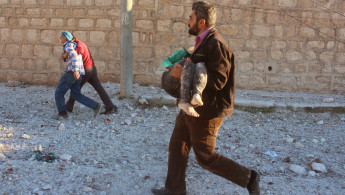Fears grow for Aleppo civilians as Syrian regime advances
The Syrian regime has continues its onslaught on rebel-held Aleppo, with the international community expresses pessimism over the fate of the city.
3 min read
Rebel-held Aleppo no longer have any functional hospitals [Anadolu]
Syrian regime forces advanced deeper into rebel-held areas of Aleppo on Monday, pressing a new offensive in defiance of international concern over the fate of the city and its residents.
Both US President Barack Obama and the UN's Syria envoy expressed pessimism about the future of the city, where more than 250,000 people are besieged in the rebel-held east.
More than 100 civilians have been killed in the east of the city since the regime's latest offensive began on Tuesday, according to the Syrian Observatory for Human Rights monitor.
The group said regime forces backed by Iranian and Russian troops and fighters from Lebanon's Hizballah had captured the eastern part of the Masakan Hanano neighbourhood.
"It is the most important advance inside the eastern neighbourhoods that the regime has made so far," said Observatory director Rami Abdel Rahman.
"If they take control of Masakan Hanano, the regime will have line of fire control over several rebel-held neighbourhoods and will be able to cut off the northern parts of rebel-held Aleppo from the rest of the opposition-held districts."
Abdel Rahman said the advance had both strategic and symbolic significance, because Masakan Hanano was the first neighbourhood to fall to rebels in 2012.
Pro-regime al-Watan daily described the neighbourhood as the "biggest and most important stronghold of the gunmen" in Aleppo.
Once Syria's economic powerhouse, Aleppo has been ravaged by the conflict that began with anti-government protests in March 2011 before spiralling into a brutal war that has killed more than 300,000 people.
The city has been divided between regime control in the west and rebel control in the east since mid-2012.
In mid-July, the regime surrounded the east, subsequently announcing an operation to recapture it completely.
Despite international outrage, including over the bombing of hospitals and rescue worker facilities, there has been little sign that foreign powers or the UN can stop the fighting in Aleppo.
Obama said Sunday he was "not optimistic about the short-term prospects in Syria".
"Once Russia and Iran made a decision to back (Bashar al-) Assad in a brutal air campaign... it was very hard to see a way in which even a trained and committed moderate opposition could hold its ground for long periods of time," he added.
Washington has backed the uprising against Assad, but has not committed military resources like Iran and Russia.
Moscow said it is not carrying out strikes on Aleppo, though last week it announced a "major operation" in neighbouring Idlib and central Homs provinces.
On Sunday, Syria's Foreign Minister Walid Muallem rebuffed a proposal from UN envoy Staffan de Mistura to halt fighting in Aleppo and allow the opposition to administer the east of the city.
Both US President Barack Obama and the UN's Syria envoy expressed pessimism about the future of the city, where more than 250,000 people are besieged in the rebel-held east.
More than 100 civilians have been killed in the east of the city since the regime's latest offensive began on Tuesday, according to the Syrian Observatory for Human Rights monitor.
The group said regime forces backed by Iranian and Russian troops and fighters from Lebanon's Hizballah had captured the eastern part of the Masakan Hanano neighbourhood.
"It is the most important advance inside the eastern neighbourhoods that the regime has made so far," said Observatory director Rami Abdel Rahman.
"If they take control of Masakan Hanano, the regime will have line of fire control over several rebel-held neighbourhoods and will be able to cut off the northern parts of rebel-held Aleppo from the rest of the opposition-held districts."
Abdel Rahman said the advance had both strategic and symbolic significance, because Masakan Hanano was the first neighbourhood to fall to rebels in 2012.
Pro-regime al-Watan daily described the neighbourhood as the "biggest and most important stronghold of the gunmen" in Aleppo.
Once Syria's economic powerhouse, Aleppo has been ravaged by the conflict that began with anti-government protests in March 2011 before spiralling into a brutal war that has killed more than 300,000 people.
The city has been divided between regime control in the west and rebel control in the east since mid-2012.
In mid-July, the regime surrounded the east, subsequently announcing an operation to recapture it completely.
Despite international outrage, including over the bombing of hospitals and rescue worker facilities, there has been little sign that foreign powers or the UN can stop the fighting in Aleppo.
Obama said Sunday he was "not optimistic about the short-term prospects in Syria".
"Once Russia and Iran made a decision to back (Bashar al-) Assad in a brutal air campaign... it was very hard to see a way in which even a trained and committed moderate opposition could hold its ground for long periods of time," he added.
Washington has backed the uprising against Assad, but has not committed military resources like Iran and Russia.
Moscow said it is not carrying out strikes on Aleppo, though last week it announced a "major operation" in neighbouring Idlib and central Homs provinces.
On Sunday, Syria's Foreign Minister Walid Muallem rebuffed a proposal from UN envoy Staffan de Mistura to halt fighting in Aleppo and allow the opposition to administer the east of the city.





 Follow the Middle East's top stories in English at The New Arab on Google News
Follow the Middle East's top stories in English at The New Arab on Google News
![Israeli forces ordered bombed Gaza's Jabalia, ordering residents to leave [Getty]](/sites/default/files/styles/image_330x185/public/2176418030.jpeg?h=a5f2f23a&itok=_YGZaP1z)

